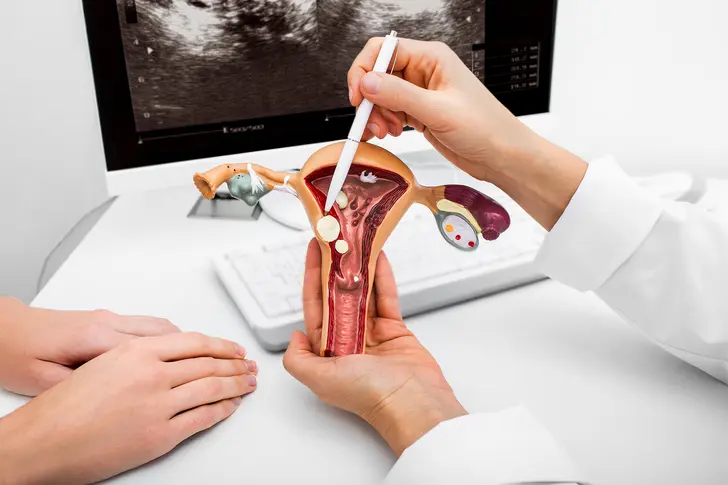Symptoms of Uterine and Endometrial Cancer


What Is Uterine Cancer?
Uterine cancer begins in the uterus, the pear-shaped organ where a baby grows during pregnancy. There are two types of uterine cancer. The most common is endometrial cancer, which starts in the endometrium, the inner lining of the uterus. Uterine sarcoma is a rare type that starts in the muscles of the uterus or the surrounding tissue.

Unusual Bleeding
The most common symptom of uterine cancer is bleeding that is not normal for you. This can include bleeding between periods, heavier or longer periods than usual, or any bleeding after menopause. Other symptoms may include pelvic pain or pressure, pain when you pee and during sex, and unexplained weight loss. It's important to note that these symptoms can also be caused by other conditions, but if you experience any of them, especially bleeding after your periods have stopped, tell your doctor.

Pelvic Pain and Pressure
Pelvic pain or pressure is another potential symptom of uterine cancer. This discomfort may feel like a general ache or pressure in the pelvic area, lower abdomen, or back. The pain might be constant or come and go, and it may worsen over time. Some women describe it as a feeling of fullness or heaviness in the pelvic region. While pelvic pain can be caused by various conditions, pain that doesn't go away or gets worse should be discussed with a healthcare professional.

Pain When You Pee or During Sex
This pain may be due to the tumor pressing on nearby organs or nerves. When you pee, you might feel a burning sensation or discomfort. Pain during sex might occur deep in the pelvis. While these symptoms can be caused by other conditions like infections or endometriosis, they should not be ignored, especially if they continue or worsen over time.

Unexplained Weight Loss
Losing weight without trying can be a symptom of various health issues, including uterine cancer. Weight loss might come with other symptoms like loss of appetite or feeling full quickly when eating. While weight loss alone doesn't necessarily mean you have cancer, when combined with other symptoms, it's worth telling your doctor.

Changes in Bladder or Bowel Habits
Changes in bladder or bowel habits can sometimes be symptoms of uterine cancer. You might find you need to pee more often or have difficulty emptying your bladder completely. Constipation or changes in bowel movements can also occur. These symptoms are often caused by the tumor putting pressure on the bladder or rectum.

Fatigue and Weakness
Feeling unusually tired or weak can be a symptom of uterine cancer, although it's important to note that fatigue can be caused by many conditions. In the case of uterine cancer, fatigue might be due to the body fighting the disease or from anemia caused by bleeding. If you're experiencing persistent fatigue that doesn't improve with rest, especially when combined with other symptoms, tell your doctor.
PHOTO CREDENTIALS
Slide 1 - Peakstock/Shutterstock
Slide 2 - fizkes/Shutterstock
Slide 3 - staras/Shutterstock
Slide 4 - MedPhotoStudio / Dreamstime.com
Slide 5 - Tero Vesalainen / Dreamstime.com
Slide 6 - BongkarnGraphic/Shutterstock
Slide 7 - fizkes/Shutterstock
SOURCES
American Cancer Society.
Lebovic, D.; Gordon, J.; Taylor, R.; "Reproductive Endocrinology & Infertility." Scrubb Hill Press, 2005.
American Association for Cancer Research: "Black Women Less Likely to Survive Endometrial Cancer."
American Cancer Society: "Endometrial Cancer," "Radiation Therapy for Endometrial Cancer," "Treatment Choices for Endometrial Cancer, By Stage," "Key Statistics for Endometrial Cancer,""Endometrial Cancer Stages."
American College of Obstetricians and Gynecologists: "Endometrial Cancer."
Mayo Clinic: "Endometrial Cancer."
National Cancer Institute: "Cancer Staging," “Cancer Stat Facts: Uterine Cancer,” "Metastatic Cancer: When Cancer Spreads."
Reviews in Obstetrics & Gynecology: "Comprehensive Surgical Staging for Endometrial Cancer."
Yale Medicine: "Uterine Cancer."
Cedars-Sinai: "Endometrial Cancer."
UpToDate: "Endometrial Carcinoma: Staging and Surgical Treatment."
The Journal of the American Medical Association: "Factors Associated With Survival Disparities Between Non-Hispanic Black and White Patients With Uterine Cancer," "Racial and Ethnic Differences in Hysterectomy-Corrected Uterine Corpus Cancer Mortality by Stage and Histologic Subtype."
Gynecology Oncology: "Uterine Serous Carcinoma."
Frontiers Oncology: "Clear Cell Carcinoma of the Endometrium: Evaluation of Prognostic Parameters in 27 Cases."